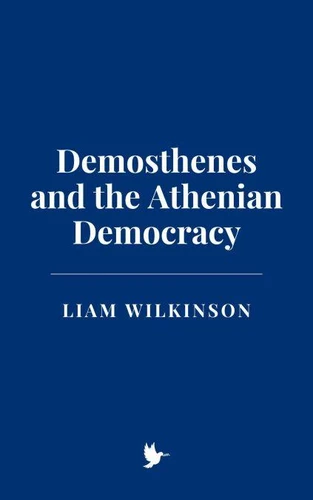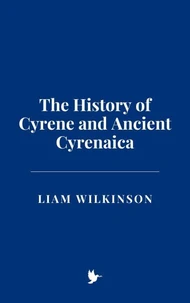Demosthenes and the Athenian Democracy
Par :Formats :
Disponible dans votre compte client Decitre ou Furet du Nord dès validation de votre commande. Le format ePub est :
- Compatible avec une lecture sur My Vivlio (smartphone, tablette, ordinateur)
- Compatible avec une lecture sur liseuses Vivlio
- Pour les liseuses autres que Vivlio, vous devez utiliser le logiciel Adobe Digital Edition. Non compatible avec la lecture sur les liseuses Kindle, Remarkable et Sony
 , qui est-ce ?
, qui est-ce ?Notre partenaire de plateforme de lecture numérique où vous retrouverez l'ensemble de vos ebooks gratuitement
Pour en savoir plus sur nos ebooks, consultez notre aide en ligne ici
- FormatePub
- ISBN8227089625
- EAN9798227089625
- Date de parution16/01/2025
- Protection num.pas de protection
- Infos supplémentairesepub
- ÉditeurBig Dog Books, LLC
Résumé
The story of Demosthenes is not merely the tale of one man's struggle against the encroaching power of Macedon but also a profound reflection on the principles, strengths, and inherent vulnerabilities of Athenian democracy. By the time of Demosthenes' birth in 384 BCE, Athens was a city haunted by its glorious past and struggling to maintain its political and military relevance in a rapidly changing Greek world.
The democracy that had emerged from the reforms of Cleisthenes in the late 6th century BCE and flourished during the leadership of Pericles was no longer the unchallenged beacon of liberty and cultural achievement it had once been. The Peloponnesian War (431-404 BCE) had left Athens weakened, its empire dismantled, and its prestige diminished. In the wake of defeat, oligarchic conspiracies, Spartan domination, and internal strife eroded the very foundations of Athenian political life.
Yet Athens remained, as Thucydides once described it, a city obsessed with freedom and restless in its pursuit of greatness. To understand Demosthenes and his political legacy, one must first grasp the intricate machinery of Athenian democracy. The Assembly (Ekklesia), where citizens gathered to debate and vote on matters of policy, was the heart of this system. It was here that Demosthenes delivered his fiery speeches, urging his fellow citizens to recognize the growing threat posed by Philip II of Macedon.
Unlike modern representative systems, the Athenian democracy was direct, with political participation viewed as both a right and a civic duty. However, this radical form of democracy came with its own weaknesses: it was prone to populism, factionalism, and the influence of demagogues. Demosthenes' career can, in part, be seen as a response to these vulnerabilities. He sought to unite his fellow Athenians not through flattery or manipulation but by appealing to their sense of history, responsibility, and shared destiny.
The democracy that had emerged from the reforms of Cleisthenes in the late 6th century BCE and flourished during the leadership of Pericles was no longer the unchallenged beacon of liberty and cultural achievement it had once been. The Peloponnesian War (431-404 BCE) had left Athens weakened, its empire dismantled, and its prestige diminished. In the wake of defeat, oligarchic conspiracies, Spartan domination, and internal strife eroded the very foundations of Athenian political life.
Yet Athens remained, as Thucydides once described it, a city obsessed with freedom and restless in its pursuit of greatness. To understand Demosthenes and his political legacy, one must first grasp the intricate machinery of Athenian democracy. The Assembly (Ekklesia), where citizens gathered to debate and vote on matters of policy, was the heart of this system. It was here that Demosthenes delivered his fiery speeches, urging his fellow citizens to recognize the growing threat posed by Philip II of Macedon.
Unlike modern representative systems, the Athenian democracy was direct, with political participation viewed as both a right and a civic duty. However, this radical form of democracy came with its own weaknesses: it was prone to populism, factionalism, and the influence of demagogues. Demosthenes' career can, in part, be seen as a response to these vulnerabilities. He sought to unite his fellow Athenians not through flattery or manipulation but by appealing to their sense of history, responsibility, and shared destiny.
The story of Demosthenes is not merely the tale of one man's struggle against the encroaching power of Macedon but also a profound reflection on the principles, strengths, and inherent vulnerabilities of Athenian democracy. By the time of Demosthenes' birth in 384 BCE, Athens was a city haunted by its glorious past and struggling to maintain its political and military relevance in a rapidly changing Greek world.
The democracy that had emerged from the reforms of Cleisthenes in the late 6th century BCE and flourished during the leadership of Pericles was no longer the unchallenged beacon of liberty and cultural achievement it had once been. The Peloponnesian War (431-404 BCE) had left Athens weakened, its empire dismantled, and its prestige diminished. In the wake of defeat, oligarchic conspiracies, Spartan domination, and internal strife eroded the very foundations of Athenian political life.
Yet Athens remained, as Thucydides once described it, a city obsessed with freedom and restless in its pursuit of greatness. To understand Demosthenes and his political legacy, one must first grasp the intricate machinery of Athenian democracy. The Assembly (Ekklesia), where citizens gathered to debate and vote on matters of policy, was the heart of this system. It was here that Demosthenes delivered his fiery speeches, urging his fellow citizens to recognize the growing threat posed by Philip II of Macedon.
Unlike modern representative systems, the Athenian democracy was direct, with political participation viewed as both a right and a civic duty. However, this radical form of democracy came with its own weaknesses: it was prone to populism, factionalism, and the influence of demagogues. Demosthenes' career can, in part, be seen as a response to these vulnerabilities. He sought to unite his fellow Athenians not through flattery or manipulation but by appealing to their sense of history, responsibility, and shared destiny.
The democracy that had emerged from the reforms of Cleisthenes in the late 6th century BCE and flourished during the leadership of Pericles was no longer the unchallenged beacon of liberty and cultural achievement it had once been. The Peloponnesian War (431-404 BCE) had left Athens weakened, its empire dismantled, and its prestige diminished. In the wake of defeat, oligarchic conspiracies, Spartan domination, and internal strife eroded the very foundations of Athenian political life.
Yet Athens remained, as Thucydides once described it, a city obsessed with freedom and restless in its pursuit of greatness. To understand Demosthenes and his political legacy, one must first grasp the intricate machinery of Athenian democracy. The Assembly (Ekklesia), where citizens gathered to debate and vote on matters of policy, was the heart of this system. It was here that Demosthenes delivered his fiery speeches, urging his fellow citizens to recognize the growing threat posed by Philip II of Macedon.
Unlike modern representative systems, the Athenian democracy was direct, with political participation viewed as both a right and a civic duty. However, this radical form of democracy came with its own weaknesses: it was prone to populism, factionalism, and the influence of demagogues. Demosthenes' career can, in part, be seen as a response to these vulnerabilities. He sought to unite his fellow Athenians not through flattery or manipulation but by appealing to their sense of history, responsibility, and shared destiny.























